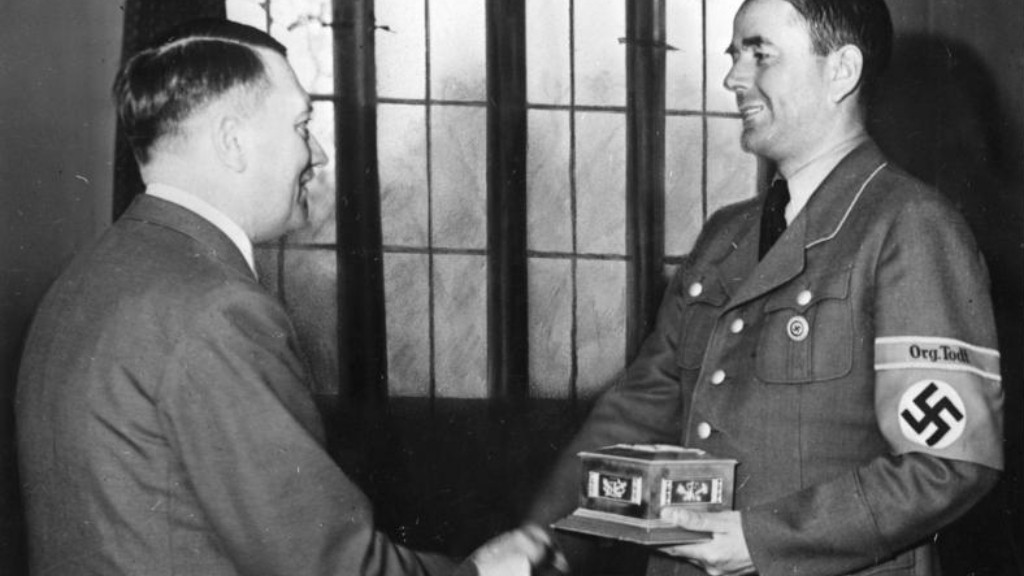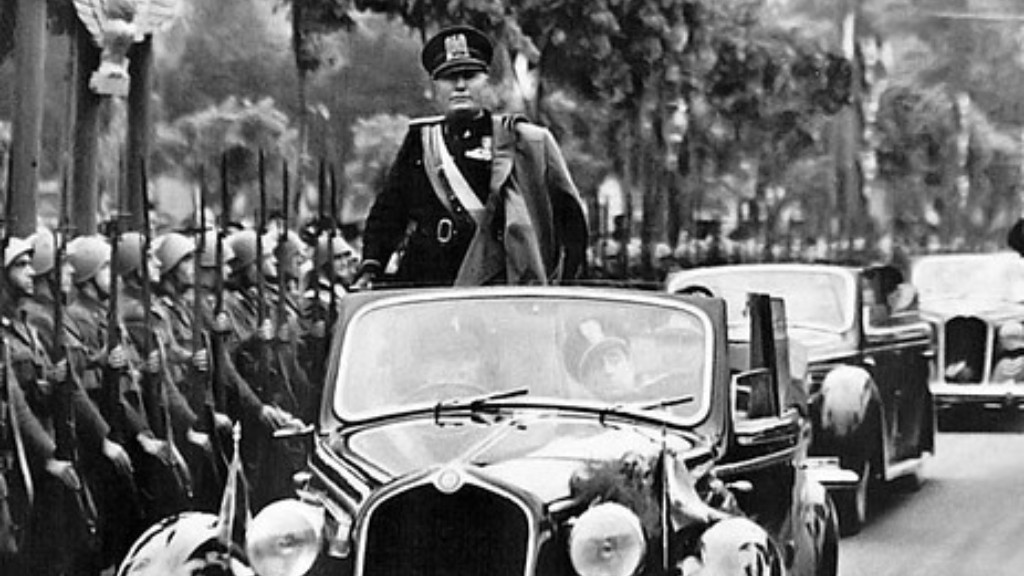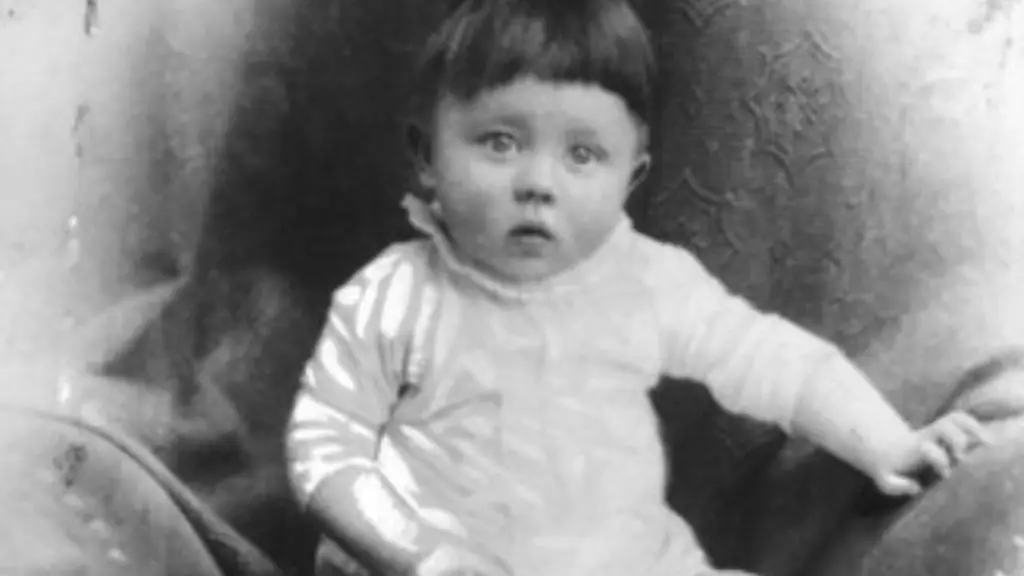Adolf Hitler’s Early Life
Adolf Hitler was born on April 20th, 1889 in Braunau am Inn, in what is now Austria. Little is known about his childhood, other than that he was born to Alois Hitler and Klara Pölzl. He had five siblings, four of whom did not survive to adulthood. Adolf attended school unenthusiastically, and even after refusing to take a few classes, he still managed to pass his exams and complete secondary school in 1905.
Shortly after gaining a certificate of secondary education, Adolf attempted to enter a prestigious art school, the Academy of Fine Arts Vienna. The application was denied, however, and it would be the first of many rejections he would experience in his life. After this bitter setback, he attempted to make a living as a painter.
Although his artwork was not sold, Adolf Hitler became very involved in politics and began giving speeches on a regular basis. He joined the German Workers’ Party (DAP) in March 1919, and soon became its leader. At the same time, he was also working as an informer for the German government.
Hitler’s Rise to Power
Adolf Hitler was an excellent orator and had a unique ability to convince people of his ideals. As a result, the popularity of the Nazi Party started to rise, and in 1932, the party had more members than any other political party in Germany. In January 1933, President Paul von Hindenburg appointed Hitler as the Chancellor of Germany, setting in motion the gradual takeover of the government by the Nazi Party.
Hitler’s accession to power was characterized by a series of purges, censorship and the dismantling of democracy. The Nazis orchestrated book burnings, held large-scale rallies, and changed the education system with their ideologies, as well as informing the German people of the dangers of the Jewish people.
Hitler identified strongly with the German people, and was keen to rid the country of its weaknesses that caused so much heartache and suffering during the inter-war period. He believed that the world could be rebuilt and improved by focusing on racial purity and strength, and this attracted many followers to the Nazi Party.
Persecution of Ethnic Groups and World War II
Adolf Hitler’s aggressive policies and actions towards neighbouring countries eventually led to World War II. He wanted to make Germany a “great” nation again and he saw war as the perfect way to make this happen. He ordered the persecution and genocide of Jews, Roma, and other minority ethnic groups and also embarked on a campaign of conquest and territorial expansion in Europe.
The Nazis were defeated in 1945, and Hitler committed suicide in his bunker on April 30, 1945. He had been in power for twelve years, leading Germany and its allies into disaster, with the death of millions of people.
Hitler’s Legacy
Adolf Hitler’s rise to power and his time in office have been the source of much controversy and debate, both in Germany and around the world. He has become a symbol of repression, hatred, and inhumane policies, but also of courage and determination for some.
To this day, there is still much debate over the causes and effects of his rule, and whether or not he was a necessary evil in order to achieve some good. While some consider him to be an intelligent strategist, others view him as nothing more than a madman with a fetish for warfare and carnage.
His totalitarian state and oppressive regime still serves as a reminder of the fragility and corrosion of democracy in times of crisis. Ultimately, the legacy of Adolf Hitler will continue to remain a contested subject among historians and politicians.
Hitler’s Impact on Popular Culture
Despite the immense suffering caused by Hitler and the Nazi regime, myths and fascination surrounding his life has continued long after his death, and his likeness has featured in a number of popular culture productions, ranging from comic books and video games to feature films and novels.
One of the most popular depictions of Hitler in recent times was in the 2004 film Downfall, which provided a highly detailed portrayal of the last days of Hitler’s life in the bunker. The film was praised for its accurate depiction of events, as well as Bruno Ganz’s performance as Hitler himself.
Another popular film about Hitler was Vince Vaughn’s 2008 comedy Swing Vote, in which Hitler makes an appearance as a sign of a fictional political campaign gone awry. The scene has polarized its viewers, with some praising its crassness and others criticizing its tastelessness.
Hitler’s presence in popular culture is not limited to the silver screen, his likeness also appearing in video games such as Wolfenstein, where players must confront him as a super villain. Similarly, his presence features prominently in the famous CCG game, Axis & Allies.
Hitler’s Popularity Among Neo-Nazi Groups
Adolf Hitler has also had a dark legacy, with his image and beliefs being adopted by many neo-fascist and neo-Nazi groups. Hitler’s fascist slogans are well known, such as the “Strength through Joy” and “He alone, who owns the youth, gains the future”.
The modern far-right has a fascination with the Third Reich and its jackboots, swastikas and other paraphernalia. These groups still idolize Hitler and his tactics, believing that he was the ideal ruler who would have succeeded in restoring the greatness of the German people, had it not been for the interference of other world powers.
There is also a wide spread belief among alt-right groups that JQ (Jewish Question) was the driving force behind their downfall and that the Jewish people were out to get them. This belief has resulted in a small but vocal neo-Nazi movement that is vehemently anti-Semitic.
The Debate Over Adolf Hitler
Adolf Hitler is a figure that continues to divide opinion. While some view him as an evil tyrant, others believe he was a brave leader and great strategist who was wronged by his enemies. Regardless of what one believes, his presence looms large in popular culture, making him one of the most debated figures in history.
Scholars, journalists and politicians around the world have argued about Hitler’s impact on the world for years, and no one can confidently say what would have happened had he stayed in power any longer than he did. Ultimately, it is impossible to gauge the full effects of Adolf Hitler on mankind and, with his death, the full truth will remain unknown.
The Debate Over the Holocaust and Hitler’s Role
Hitler’s most notorious legacy is his role in the Holocaust, and there has been much debate over the extent of his involvement in the mass extermination of millions of innocent people. Historians agree that he was partly responsible for the atrocities that occurred, but exactly how much involvement he had is something that is still highly contested.
The debate over the Holocaust has been further complicated by the recent emergence of anti-Semitic movements, which have sought to deny the full extent of the genocide, or even to exonerate Hitler from the atrocities. These attempts have been met with fierce resistance, with those challenging them being met with philosophical arguments and evidence from historians.
In recent years, governments around the world have taken steps to ensure that the memory of the Holocaust, and Hitler’s role in it, remain fresh in the minds of the public. This has taken the form of memorials, education programs and laws that prohibit hate speech and symbols associated with Nazism.
The Myth of the ‘Great Leader’
No matter what one believes of Hitler, he remains an enduring figure in history. He has become a symbol of evil and power, but also a symbol of determination and stubbornness. It is this duality that makes him so interesting and fascinating, even after his death.
For some, Hitler represents a great leader and a brilliant strategist, willing to take drastic measures in pursuit of his vision. For others, he is a figure of pure malevolence and hatred, a man whom history will never truly forgive.
The debate over the legacy of Adolf Hitler continues to divide opinion to this day, and it is unlikely that the controversy around him will dissipate anytime soon. Even so, despite all the horrors he has caused, Hitler continues to remain a figure of fascination and reverence in some parts of the world.




